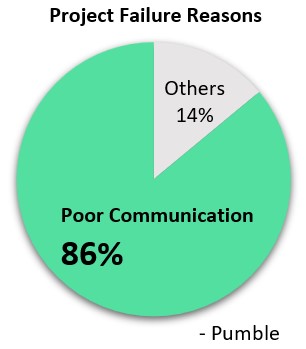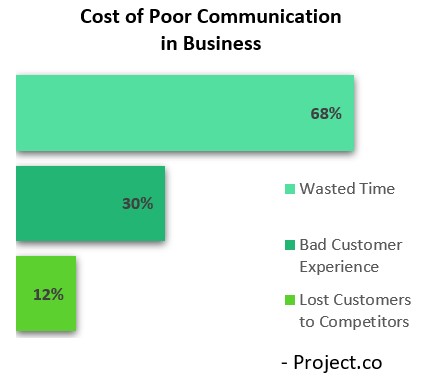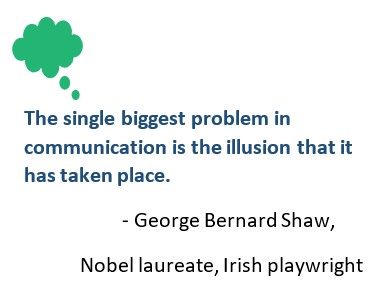
You are leading a critical project with high stakes. You have a team of talented individuals with diverse skills, expertise, and project team roles, all working towards a common goal. Did you know communication, or rather, the lack of it, is the primary cause of project failures? A startling 86% of failures are  attributed to poor communication within the project team, per Pumble’s Communication in the Workplace statistics 2023 list. Furthermore, per the 540 business leaders and employees that participated in Axios HQ’s the 2023 state of essential workplace communications survey, ineffective communication cost $2 trillion loss for US businesses alone! Yes, you read that right. So, what can you, as a project manager, do to prevent such a debacle? The answer lies in a simple yet profound action: listen to your project team members and help them understand the roles of project management.
attributed to poor communication within the project team, per Pumble’s Communication in the Workplace statistics 2023 list. Furthermore, per the 540 business leaders and employees that participated in Axios HQ’s the 2023 state of essential workplace communications survey, ineffective communication cost $2 trillion loss for US businesses alone! Yes, you read that right. So, what can you, as a project manager, do to prevent such a debacle? The answer lies in a simple yet profound action: listen to your project team members and help them understand the roles of project management.
The Importance of Project Team Communication in Project Management
Effective project team communication is the cornerstone of successful project management. It ensures that all team members are on the same page, understand their project management roles and responsibilities, and are aligned with your project's objectives.
Per a recent PMI report, organizations with effective communication met 80% of project goals and achieved project success compared to 52% of organizations with average interactions.
By actively listening to your team, you create an environment where:
- Ideas flow freely,
- Issues are addressed promptly,
- Collaboration thrives.
Understanding the Cost of Poor Communication
The consequences of poor communication in project management can be severe. Misunderstandings, delays, and conflicts can arise, leading to budget overruns and missed deadlines. Poor communication can cost as much as $62.4 million per year per company per the Pumble study! These staggering figures underscore the criticality of effective communication in project success.
Why Projects Fail: Lack of Communication
Let's delve deeper into why projects fail due to a lack of communication.
A Harvard Business Review study reveals that 57% of employees report not being given clear directions about roles and responsibilities. Furthermore, 69% of project managers are uncomfortable communicating with project team members.
In the report by Axios HQ, 70% of leaders thought they conveyed goals, strategies, directions, and project management team roles perfectly. However, only 46% of the participating project teams confirmed in affirmative. As a result, not many understood how they contributed to the overall growth of the company. A Stafiz report suggests only 58% of the organizations fully understand the value of their project at any given time.
These numbers are alarming and emphasize the urgent need for improved communication practices within project teams.
The Role of Project Managers: Listening and Engaging
As a project leader, your role goes beyond just assigning tasks and roles and responsibilities in project management. You must actively listen to your team members and encourage open communication about team project roles. According to Pumble, 28% of employees believe their managers could improve by actively seeking their project stakeholder feedback. By being receptive to your project team's ideas, concerns, and suggestions, you foster a culture of trust and transparency for their role as the project team.
Team Roles in a Project: Diverse Perspectives
Pumble suggests that 44% of project professionals attribute project failure to poor communication and network among team members. All members play vital roles in the project team. The roles and responsibilities in project management are diverse, ranging from subject matter experts to project coordinators, analysts, and more. Embracing these varied perspectives can lead to innovative solutions and a more comprehensive approach to problem-solving roles in project management.
Improving Project Success Rate through Communication
Effective communication directly influences project success rates. When you actively involve your project team members and clearly communicate their project management team roles, the chances of meeting project objectives and exceeding client expectations increase significantly. 62% of the Project.co’s Communication Statistics 2023 survey respondents affirm that a good project management tool can increase the rate of project success.
The Impact of Poor Communication on Project Teams

Poor communication affects not only the project manager but the entire team. It can lead to decreased motivation, lowered morale, and increased employee turnover. Project.co’s report indicates that poor project communication causes challenges in time mismanagement, customer experience, and even missed business opportunities! In contrast, teams with effective communication practices with clients enjoy a 62% higher likelihood of project success. So, the benefits of active listening and fostering effective communication channels cannot be excessive.
The Project Leader's Responsibility: A Listening Ear
As a project leader, you are not expected to have all the answers. However, by actively listening to your project team members and concerns about their project management roles, you tap into a wealth of knowledge and experience. This, in turn, empowers your team to contribute fully to the project's success. In fact, organizations that have invested in relevant project management practices spend 28x less money to complete their strategic initiatives, per a ProofHub report.
Embrace Communication for Success
In conclusion, a project's success lies in its project team's hands and how effectively they fulfill their roles. By recognizing the importance of communication in project management, project leaders can create a positive and collaborative environment that nurtures success. As you embark on your project management journey, remember the power of active listening and the impact it can have on your team's performance.
By truly listening to your project team members, you can:
- Uncover unspoken concerns,
- Identify opportunities for improvement,
- Foster a culture of trust and teamwork.
Listen and engage with your project team. Be the catalyst for effective communication, and watch as your projects thrive, your team excels, and project success becomes a well-deserved reality.
TrueProject allows project teams to remain ahead of the curve by actively seeking useful input from project stakeholders. It supports a culture of open communication and collaboration among team members by providing a user-friendly platform for sharing ideas and concerns. This continuous feedback loop guarantees that potential difficulties and concerns are discovered and addressed before they escalate and interrupt your project's progress. As a result, project teams can implement critical upgrades and optimizations more quickly, paving the road for increased project success. TrueProject's ability to integrate real-time input leads to more effective project execution and higher stakeholder satisfaction, establishing its place as a vital tool in the project management world.
More on TrueProject at trueprojectinsight.com

About the Author:
Dale Malcolm is the Director of Trueproject Customer Success with over 30 years of experience spanning software development, consulting, and business process re-engineering across multiple industries and countries. He has excelled in roles ranging from lead architect for data collection systems to database architect for telecom software, and has led various teams in implementing cost-effective and efficient IT solutions, including ERP and Enterprise Architecture practices.
Endnotes
- Andrews, Ward. “Why Projects Fail: Lack of Communication.” Drawbackwards, 2021, June 22, 2021. https://www.drawbackwards.com/blog/why-projects-fail-lack-of-communication
- Axios HQ. “The 2023 state of essential workplace communications.” 2023. https://www.axioshq.com/research/2023-state-of-workplace-communications
- Indeed. “Importance of Communication in Project Management.” December 06, 2022. https://www.indeed.com/career-advice/career-development/importance-of-communication-in-project-management
- M, Shannon. “10 Reasons for Project Management Failure.” Stafiz, March 12, 2020. https://stafiz.com/10-reasons-for-project-management-failure
- Naybour, Paul. “Poor Communication: Cause or Symptom in Project Failures.” Association for Project Management, January 17, 2022. https://www.apm.org.uk/blog/poor-communication-cause-or-symptom-in-project-failures/
- Project.co. “Communication Statistics 2023.” November, 2022. https://www.project.co/communication-statistics/
- Provek “The Importance of Active Listening and Stakeholder Engagement for Project Success.” https://www.provek.co.uk/the-importance-of-active-listening-and-stakeholder-engagement-for-project-success/
- Pumble. “Communication in the workplace statistics 2023 Communication Statistics.” 2023. https://pumble.com/learn/communication/communication-statistics/
- Sharma, Nandini. “30 Authentic Project Management Statistics You Cannot Afford to Miss!” May 20, 2023. https://www.proofhub.com/articles/project-management-statistics
- Solomon, Lou. “Two-Thirds of Managers Are Uncomfortable Communicating with Employees.” 2016, March 09, 2016. https://hbr.org/2016/03/two-thirds-of-managers-are-uncomfortable-communicating-with-employees?
- Villanova University. “Project Communication Plan Definition, Tips and Tactics.” September 30, 2021. https://www.villanovau.com/resources/project-management/project-communication-plan/





